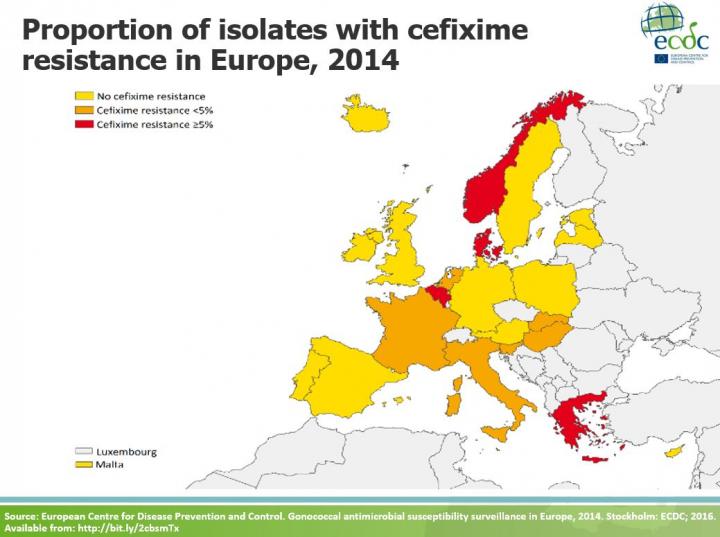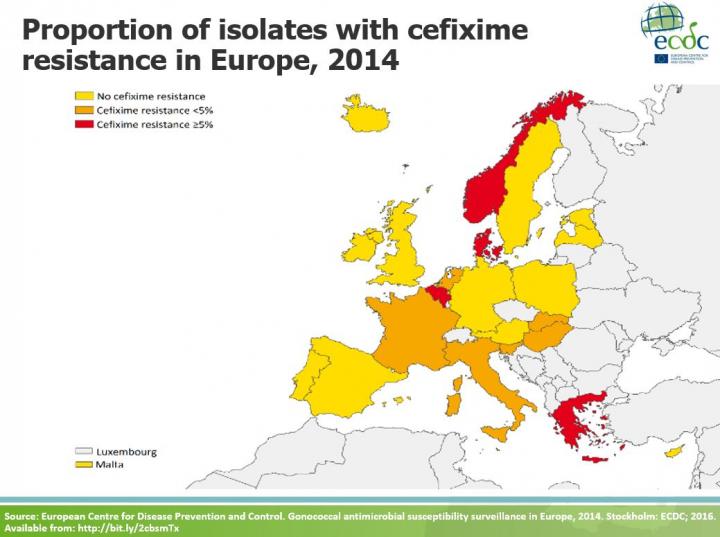
Credit: European Centre for Disease Prevention and Control
In 2014, the susceptibility of gonococci to two of the recommended antibiotics for gonorrhoea treatment has shown signs of improvement, according to results from the European Gonococcal Antimicrobial Surveillance Programme (Euro-GASP). At the same time, a significant increase in resistance to another antibiotic agent that is part of the suggested dual therapy of gonorrhoea was observed.
On an annual basis, countries of the European Union and European Economic Area (EU/EEA) participate in Euro-GASP to test susceptibility of Neisseria gonorrhoeae to the antibiotics commonly used for gonorrhoea treatment.
In 2014, 23 EU/EEA countries collected and tested more than 2 000 gonococcal isolates and found a significantly lower proportion with cefixime resistance (2%), compared with 2013 when 4.7% of the tested isolates were not susceptible to this drug. The 2014 results continue the trend of decreasing cefixime resistance that started in 2010 (8.7%) but was interrupted by a slight increase in 2013.
The ECDC report Gonococcal antimicrobial susceptibility surveillance in Europe 2014 [add link] also shows that resistance to the antibiotic azithromycin has continued to rise across Europe since 2012 to a level of 8% of tested isolates in 2014. The highest resistance to this recommended drug was seen among isolates taken from men who have sex with men (10%) and male heterosexuals (9%) while the lowest levels were found among those from females (2%).
"The observed drop in cefixime and ceftriaxone resistance in Europe is encouraging", says Andrew Amato, Head of ECDC's programme on HIV/AIDS, sexually transmitted infections and viral hepatitis. "But knowing the history of Neisseria gonorrhoeae and antimicrobial resistance, we can expect that resistance levels will rise again in future years, leading to treatment failures. This is particularly worrying should azithromycin resistance levels also continue to increase. If we want to ensure that gonorrhoea remains a manageable infection, we have to continue to implement ECDC's 'European response plan to control the threat of multidrug-resistant gonorrhoea'".
Euro-GASP monitors emerging resistance trends
As the control of gonorrhoea depends on effective antimicrobial treatment, even a small increase in drug resistance has a relevant impact due to the risk of treatment failure.
Since the European treatment guidelines for gonorrhoea recommend use of two antimicrobials (ceftriaxone or cefixime in combination with azithromycin), the surveillance of antimicrobial susceptibility of these agents – which is currently undertaken by ECDC's Euro-GASP – is vital to guide clinical services to ensure that patients are successfully treated and the risk of complications are avoided.
With more than 66 000 reported cases in 2014, and many more infections occurring but not reported, gonorrhoea is the second most frequently recorded sexually transmitted infection in Europe after chlamydia.
ECDC launched a regional response plan to control multidrug-resistant gonorrhoea to minimise the threat of drug-resistant gonorrhoea in Europe. This plan argues that countries need to ensure they have the minimum capacity for culture and susceptibility testing. They must also have strategies for rapid identification and reporting of failures to treatment with currently recommended antimicrobials. At the same time, antimicrobial resistance surveillance and awareness of this problem should be stepped up so that measures can be taken to ensure that options for successful treatment of gonorrhoea remain available in the EU.
###
Read the full ECDC report Gonococcal antimicrobial susceptibility surveillance in Europe 2014
Related news: Europe sees constant increase in gonorrhoea infections
Media Contact
ECDC Press Office
[email protected]
46-858-601-678
@ECDC_EU
http://ecdc.europa.eu





